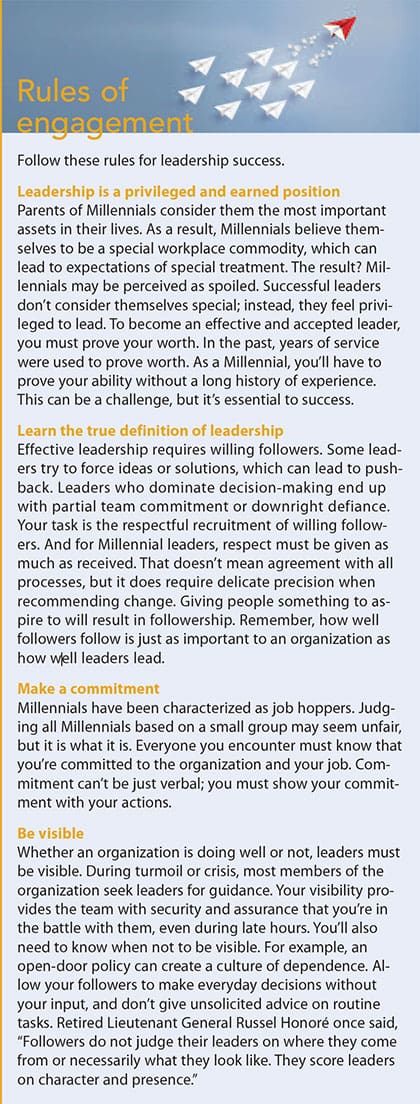How do you become a great leader in a multigenerational workplace?
Takeaways:
- Millennials who strive to be leaders must embrace rules of engagement, read leadership books, make a plan to improve, and seek guidance from other generations on personal growth.
- Become the leader you wanted your superior to be by assessing your emotional intelligence and self-awareness of core values.
By Amanda Veesart, PhD, RN, CNE
 Generational differences have been a popular topic for years, generating many articles and books. The first generational definition dates back to the 1950s when Mannheim published an article defining generations as groups of people who were born and raised in the same chronological years. Since then, many authors have published on generational core values, the differences concerning core values of each generation, and the challenges between generations.
Generational differences have been a popular topic for years, generating many articles and books. The first generational definition dates back to the 1950s when Mannheim published an article defining generations as groups of people who were born and raised in the same chronological years. Since then, many authors have published on generational core values, the differences concerning core values of each generation, and the challenges between generations.
Recently, the focus has been on the impact of generational differences in the workplace. Millennial nurses entered the nursing workforce about 20 years ago and have been a topic among healthcare organizations ever since. The literature is saturated with ideas, strategies, and solutions for recruiting and retaining Millennial nurses. However, little literature or guidance exists on how to become a nurse leader if you’re a Millennial. Understanding the impact of common Millennial characteristics in the workplace is the first step to becoming an effective leader. Many Millennials have significantly different workplace needs, skills, and expectations from previous generations.
As a Millennial leader myself, I’d like to share tips for how those of our generation can become successful workplace leaders.
Welcome to a workplace that doesn’t understand you
Although some Millennial core values are similar to those of other generations (for example, morality and civic duty are reflective of the Veterans generation and work-life balance is similar to Generation X), the ones that differ can make Millennials seem like spoiled, unsatisfied brats. For example, the most common characteristic used to describe Millennials in the workforce is “job hopper.” Research shows that most Millennials seek a job that offers flexibility, recognition, innovation, and an opportunity to make an impact on the world, and they’re willing to move from one place to another to find it. Although changing jobs can boost your skills, other generations in the workplace may view it negatively, seeing frequent change as a lack of commitment.
The first step to overcoming stereotypes about the Millennial generation is knowing that these differences are sometimes misunderstood. And it’s good to keep in mind that nurses of all generations—not just Millennials—face challenges and misconceptions by others in the workplace.
Understanding the misunderstandings
Here are some common statements or questions you can expect when pursuing a leadership role:
- You’re not old enough, and you haven’t put in your time to take on a leadership role.
- You’re always looking for a different way to do things. Why do you want to change what we’ve always done?
- You seem to have more interest in leaving work early to go have fun versus staying to work extra hours. Why aren’t you more loyal?
- You want to move up the career ladder too quickly and if you don’t, you’ll leave.
- You always want to make things more efficient by adding technology.
- You grew up in the era when everyone got a trophy, so you always expect to win.
- You want more money but you don’t want to work for it, so you’re a job hopper.
The good news about these statements is that most leaders, not just Millennials, have heard one or more applied to them, so the intent behind the comment probably isn’t personal. However, the comments may feel personal and can create tension in the workplace. Embrace each comment as a misunderstanding of core values, and don’t assume everyone holds or appreciates the same values as you. This doesn’t give someone permission to belittle you, but most of these types of comments are the result of misinterpretation of intentions or poor communication.
Tips for Millennials on becoming a great leader
Use these tips to help you succeed on your path to becoming a nurse leader.
Brush that chip off your shoulder
Stereotypes have always existed in the workplace. The following comments are from published surveys:
- “Loyalty. Gratitude. Fortitude. They’re dead, man.”
- “You might want to laugh derisively the first time one of your youngest subordinates tells you he intends to work a mere 40-hour week so he can go scuba diving and learn a non-Indo-European tongue.”
- “We’re dealing with a lot of tender little egos. They have to be told they’re loved quite frequently.”
You may assume these comments are about Millennials. However, the first two were retrieved from surveys regarding Generation X, and the last was written in 1969 about Baby Boomers. This is a prime example of past generations experiencing the same criticisms as Millennials. As a Millennial leader, you must learn not to react defensively. If you take on a leadership role, expect criticism, but don’t fear it.
Assess your emotional intelligence
The most successful leaders have an optimistic attitude, a desire to learn quickly, are open-minded thinkers, and balance emotions. Emotional intelligence (EI) is defined as the ability to recognize, understand, and balance your own emotions. Although not supported by research, Millennials are assumed to lack communication, conflict resolution, empathy, and leadership skills. A recent EI study showed Millennials demonstrate high emotional stability with regard to interpersonal relationships but score lower than other generations on self-awareness and emotional mentoring. Don’t confuse EI with intelligence quotient (IQ). The ability to score well on an IQ test doesn’t mean that you have high EI. Good EI requires ongoing assessment of yourself and your interactions with others.
 Learn the generational differences
Learn the generational differences
The unique experience of each generation can create differences in values, gender issues, cultural biases, and team building. Millennials are the most ethnically and racially diverse generation in American history. And in some cases, they’re the most educated generation in the workplace and may even possess higher degrees than older supervisors, creating a point of contention. Understanding the differences between the generations will enhance your ability to advance quickly into a leadership position.
Certain core value differences, such as drive, are more important than others to understand in the workplace. Although not true for all Millennials, many were taught to acquire almost anything they want very quickly. In contrast, many Baby Boomers were taught to think thoroughly about all major decisions before moving forward. These differences in drive can be a barrier in the workplace. Moving too quickly may undermine a colleague’s ability to think through projects, create feelings of resentment or loss of autonomy, and ultimately, undermine his or her confidence. Knowing this difference may exist, and also understanding that individuals within each generation vary, should inspire a leader to slow the pace of decision-making to allow all participants an opportunity to process each component. With five generations in the nursing workforce, leaders need to meet the expectations of each generation to ensure organization success.
Understand the rules of engagement
All leaders, regardless of age, generation, or experience, have a set of rules for the workplace—the rules of engagement. These rules have existed for decades, and Millennials won’t change them. Rather than challenge the status quo, accept that the rules exist and follow them to help you advance at work. (See Rules of engagement.)
Position yourself to lead
Understanding the challenges you may encounter as a Millennial is key to advancing into a leadership role. Use good judgment and always be true to yourself, while also consistently learning how to improve your skills. Frequently, a leader isn’t in front of the pack but is willing and able to move to the front if needed. Position yourself to be a great leader and be ready when opportunity knocks.
Amanda Veesart is an assistant professor in the school of nursing at Texas Tech University Health Sciences Center in Lubbock.
Selected references
Bennis W, Goldsmith J. Learning to Lead: A Workbook on Becoming a Leader. 4th ed. New York: Basic Books; 2010.
Miller M. The Heart of Leadership: Becoming a Leader People Want to Follow. San Francisco, CA: Berrett-Koehler Publishers, Inc.; 2013.
Sanborn M. You Don’t Need a Title to Be a Leader: How Anyone, Anywhere, Can Make a Positive Difference. New York: Doubleday; 2006.
ant4-Millennials-329


















